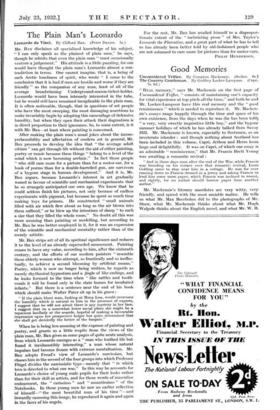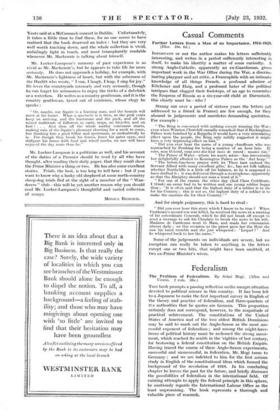Good Memories
"REAL memory," says Mr. Mackenzie on the first page of Unconsidered Trifles, "consists of maintaining one's capacity for vital experience at top pitch all the time," and both he and Mr. Locker-Lampson have this real memory and the "good reminiscence" which is needed to reproduce it. Mr. Macken- zie's essays range happily through the time and space of his own existence, from the days when he was (he has been told) "a very, very sweetly inquisitive little boy," and the bygone summer holidays of which he has already talked from Savoy Hill. Mr. Mackenzie is known, especially to Scotsmen, as an inveterate islander : and though nothing about Scotland has been included in this volume, Capri, Jethou and Herm loom large and delightfully. It was on Capri, of which one essay is an admirable "reminiscence," that Mr. Francis Brett Young was awaiting a romantic revival : "And in those days soon after the end of the War, while Francis was brooding on his terrace over that romantic revival, Louis Golding came to stay near him in a cottage. He was for ever running down to Francis dressed in a jersey and asking Francis to lend him some more paper, which Francis was inclined to resent, and rightly, for no author should borrow paper from another author."
Mr. Mackenzie's literary anecdotes are very witty, very friendly, and spiced with the most amiable malice. He tells us what Mr. Max Beerbohm did to the photographs of Mr. Shaw, what Mr. Mackenzie thinks about what Mr. Hugh Walpole thinks about the English novel, and what Mr. W. B.
Yeats said at a McCormack concert in Dublin. Unfortunately, it takes a little time to find these, for no one seems to have realized that the book deserved an index : but they are very well worth tracking down, and the whole collection is vivid, unfailingly light in touch, and most triumphantly readable whenever Mr. Mackenzie is talking about himself.
Mr. Locker-Lampson's memory of past experience is as vivid as Mr. Mackenzie's, but he appears to take life far more seriously. He does not approach a holiday, for example, with Mr. Mackenzie's lightness of heart, but with the soberness of the Hazlitt who wrote, " I run, I laugh, I leap, I sing for joy." He loves the countryside intensely and very seriously, though he can forget his seriousness to enjoy the tricks of a dabchick or a waterhen. He writes as a country gentleman, and it is the country gentleman, taxed out of existence, whose elegy he speaks :
"Or, maybe, our Squire is a hunting man, and the hounds will meet at his house. What a spectacle is it then, as the pink coats keep on arriving, and the huntsman and the pack, and all the mixed multitude of followers in carts, traps, on bicycles, and on foot ! . . . And then off the whole motley concourse starts, making ruin of the Squire's pheasant shooting for a week to come, but thinking him a good fellow and sportsman, as undoubtedly he is. For though they break his fences, leave his gates open, and disfigure his lawns with hoof and wheel marks, no one will have enjoyed the day more than ho."
Mr. Locker-Lampson is a politician as well, and his account of the duties of a Premier should be read by all who have thought, after reading their daily paper, that they could show the Prime Minister a thing or two. He has also some excellent stories. Trials, the best, is too long to tell here : but if you want to know why a lanky old shepherd at some north-country sheep-dog trials fled at the sight of a member of the " Wan- derers " club—this will be yet another reason why you should read Mr. Loeker-Lampson's thoughtful and varied collection of essays.
MONICA REDLICH.















































 Previous page
Previous page